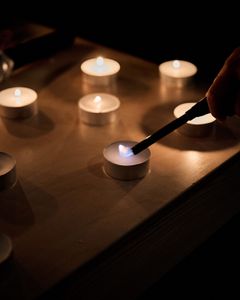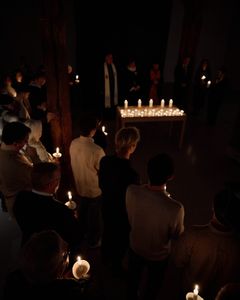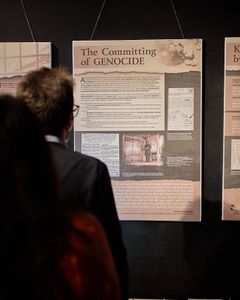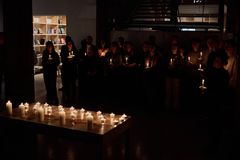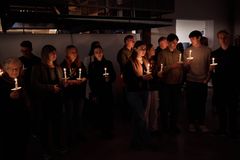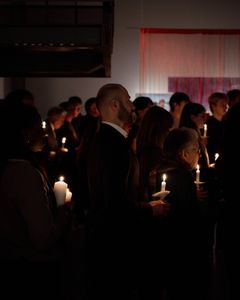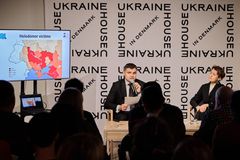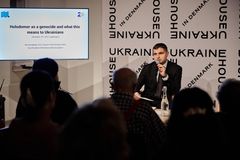Recognizing the Holodomor as genocide is a step to honor the memory of the victims – Dr. Horodyskyy
1.12.2023 14:51:18 CET | Ukraine House in Denmark | Pressemeddelelse
Dr. Ivan Horodyskyy, Vice-President of the Ukrainian Bar Association, appealed to the Danish parliament with a сordial request to make every effort to establish justice for the victims of the Holodomor by recognizing it as genocide. The expert spoke during the commemorative event “Holodomor – 90: impact on Ukraine and the future of justice” held at Ukraine House in Denmark on Nov. 25.
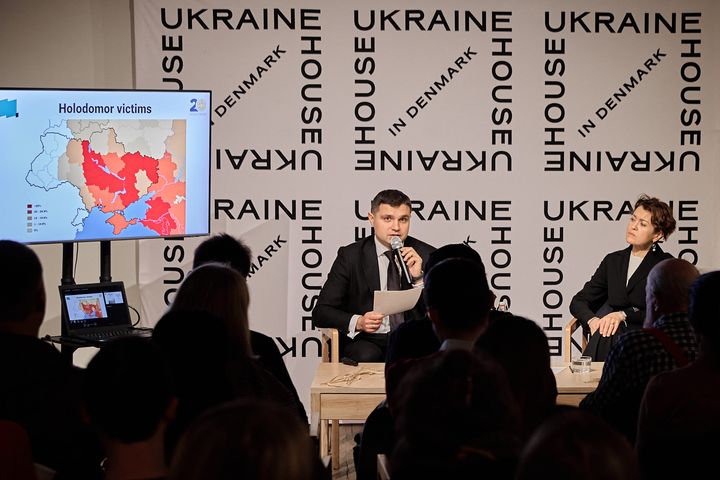
“For many Ukrainians, Denmark is the best example of what the idea of Europe is and should be. In Ukraine, they see and appreciate how unconditionally you supported us and your contribution to our struggle - from F-16 fighter jets to fresh water for the residents of front-line Mykolaiv… On behalf of the legal community of Ukraine, I appeal to our Danish friends with a request to make every effort to establish justice for the victims of the Holodomor by recognizing it as genocide,” said Dr. Horodyskyy.
He reminded the audience that during 1932-33 about 4 million Ukrainians became victims of the Holodomor genocide, the gravest crime recognised by international law. The victims of the Holodomor were killed not only because of their nationality, language or religion but also because of their desire to protect private property and have freedom of choice — the very values shared by Ukraine's modern-day allies. Unfortunately, 90 years later, this fact often is not enough for full worldwide recognition of this crime as genocide.
Dr. Horodyskyy said that from a legal standpoint, there are many challenges to the recognition of the Holodomor as a crime of genocide. However, he noted that many of the possible questions surrounding the recognition have been answered a long time ago.
On Dec. 9, the world will mark the anniversary of the adoption of the UN Convention on Genocide. Its co-author and creator of the crime's definition was Rafael Lemkin, a Second World War refugee and a thorough researcher of Nazi crimes.
Lemkin studied the legal system of the USSR and its criminal law. In 1953, he gave a speech to the Ukrainian diaspora in New York, the title of which was “Soviet Genocide in Ukraine," where he proclaimed that not only the Holodomor, but also the entire policy of the Soviet government aimed at destroying the identity of Ukrainians, was genocide.
In Dr. Horodyskyy’s opinion, Russia's aggression against Ukraine today is a continuation of its past practice of genocide in Ukraine – yet while it is clear that Holodomor of 1932-1933 was a genocide, it will take longer to gather evidence for Russia's current war against Ukraine and qualify it as genocide.
“The problem is that in 1948, different compromises were made and the Genocide Convention envisaged only physical genocide. Rafael Lemkin’s definition of genocide included notions that were broader and went beyond that of physical destruction. It included cultural genocide, social genocide, and many other types of genocide which we can see now in the temporary Russian-occupied territories of Ukraine,” explained Dr. Horodyskyy.
Photos: Alex Benes
For press inquiries, please contact Maya Zakhovaiko press@ukrainehouse.dk
Billeder
Følg pressemeddelelser fra Ukraine House in Denmark
Skriv dig op her, og modtag pressemeddelelser på e-mail. Indtast din e-mail, klik på abonner, og følg instruktionerne i den udsendte e-mail.
Flere pressemeddelelser fra Ukraine House in Denmark
Ukraine House in Denmark Opens “Voices of Dignity: Literature of Resistance” Exhibition – A Century of Ukrainian Cultural Defiance20.2.2026 10:49:04 CET | Presseinvitation
On February 23, 2026, Ukraine House in Denmark opens its new exhibition “Voices of Dignity: Literature of Resistance” — an exploration of how Ukrainian literature has functioned not only as art, but as an act of resistance across the twentieth and twenty-first centuries. It is a tribute to the Ukrainian literary voices who were persecuted or silenced under imperial and totalitarian regimes, those who were killed as a result of Russia’s full-scale invasion, and those who continue to write under the conditions of war.
Nobelprismodtager, danske stjerner og ukrainske forfattere markerer fireåret for krigen i Ukraine med storstilet solidaritetsaften på Det Ny Teater13.2.2026 12:43:20 CET | Presseinvitation
Den 22. februar 2026 inviterer Ukraine House in Denmark, Dansk Kulturinstitut og Det Ny Teater til ”Ukrainske Stemmer – historier om frihed”, en solidaritetsaften for Ukraine på tærsklen til fireåret for Ruslands fuldskalainvasion. På scenen kan bl.a. opleves den ukrainske nobelprismodtager Oleksandra Matviichuk, den danske verdensstjerne Nikolaj Coster-Waldau, Bodil Jørgensen, Ellen Hillingsø, Christine Albeck Børge, et 26 personers stort kammerorkester, samt en række ukrainske kunstnere.
Nobel Prize winner, Danish stars and Ukrainian writers mark the fourth anniversary of the war in Ukraine with a solidarity evening at Det Ny Teater30.1.2026 12:48:22 CET | Presseinvitation
On February 22, 2026, Ukraine House in Denmark, the Danish Cultural Institute and Det Ny Teater invite you to “Ukrainian Voices – Stories of Freedom”, a solidarity evening for Ukraine on the eve of the fourth anniversary of Russia’s full-scale invasion. On stage, you can experience, among others, the Ukrainian Nobel Prize winner Oleksandra Matviichuk, the Danish world star Nikolaj Coster-Waldau, Bodil Jørgensen, Ellen Hillingsø, Christine Albeck Børge and a number of Ukrainian artists.
Udstillingen »My Body Is a Battlefield« udsat for hærværk i København23.12.2025 12:39:22 CET | Nyhed
København, 23. december 2025 – Ukraine House in Denmark (UHD) og Spilne Art fordømmer på det kraftigste hærværket mod skulpturerne fra udstillingen »My Body Is a Battlefield. Copenhagen« [Min krop er en slagmark, København] af den ukrainske kunstner Mariia Kulykivska. Udstillingen, der var organiseret af Spilne Art i samarbejde med Ukraine House i Danmark, blev udsat for hærværk i fuldt dagslys den 22. december 2025 i nærheden af UHD's lokaler.
Exhibition “My Body Is a Battlefield.” vandalised in Copenhagen23.12.2025 11:27:49 CET | Nyhed
Copenhagen, 23 December 2025 — Ukraine House in Denmark (UHD) and Spilne Art strongly condemn the vandalism of outdoor sculptures from the exhibition “My Body Is a Battlefield. Copenhagen” by Ukrainian artist Mariia Kulykivska. The exhibition, organised by Spilne Art in cooperation with Ukraine House in Denmark, was vandalised in broad daylight on 22 December 2025 near the premises of UHD.
I vores nyhedsrum kan du læse alle vores pressemeddelelser, tilgå materiale i form af billeder og dokumenter samt finde vores kontaktoplysninger.
Besøg vores nyhedsrum
